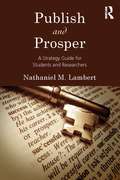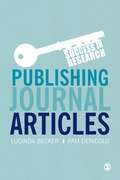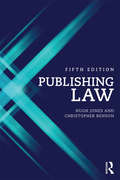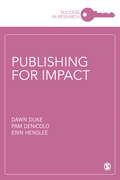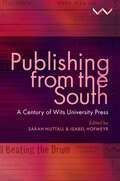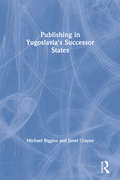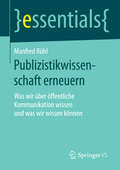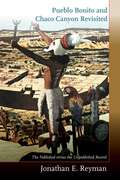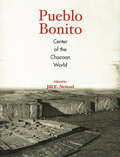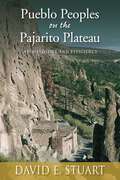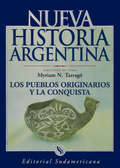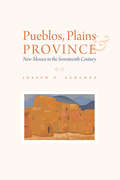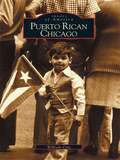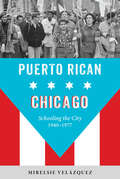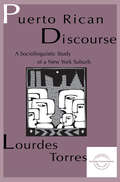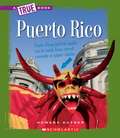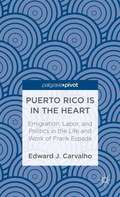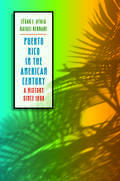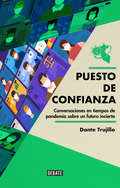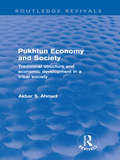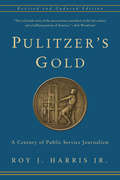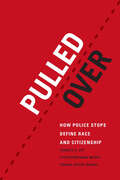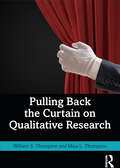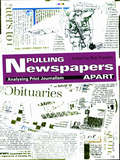- Table View
- List View
Publish and Prosper: A Strategy Guide for Students and Researchers
by Nathaniel M. LambertIntended to help readers succeed in academia by increasing their scholarly productivity, this book provides strategies for getting articles published quickly in reputable research journals. Rather than focusing on the basics of writing about results, this unique guidebook provides tips on how to approach research, maintain motivation, maximize productivity, and overcome common pitfalls so as to become productive scholars. The strategies reviewed will help readers successfully navigate through graduate school, get a good job, receive grants and promotions, and make important contributions to their field. Written in a breezy style, this book offers case studies, examples, and personal experiences that illustrate the themes of the chapters. Introductions and summaries and key points help to highlight the most critical concepts reviewed in each chapter. Chapter exercises encourage self-reflection and/or the application of the strategies introduced in that chapter. Self-assessment questions in Appendix A help readers pinpoint their strengths and weaknesses.A tracking chart, referred to throughout, provides an effective way to follow the progress of several manuscripts that are at different stages. An interactive version of the chart is available at www.pepstrategies.com along with the time diary and the chapter and self assessment exercises. Although a young scholar, Nathaniel Lambert has an impressive track record. He already has over 50 papers published in research journals. This book reviews winning strategies practiced by the author and additional insights based on conversations with top producing scholars. By diligently applying this book’s core strategies, you too can publish and prosper! Part 1 describes issues related to prioritizing one’s research such as the importance of selecting the right topic and how to use goals and deadlines to enhance motivation. Tips for enhancing efficiency are provided in Part 2 including how to improve writing efficiency, juggle several projects simultaneously, reduce wasting time, and select the best collaborators. Part 3 explores productivity pitfalls and how to avoid them. Tips on how to avoid burnout and distractions and handle rejection are explored. Part 4 provides unique tips to apply at various stages of one’s academic career: undergraduate, graduate, and professional. Practical appendices provide an opportunity to determine one’s strengths and weaknesses keep track of projects, and expand one’s knowledge using the recommended reading list. Intended as a reference for students who are planning to attend graduate school and/or pursue an academic career, this book is ideal for professional development and/or research methods courses taught in the behavioral, social, health, and life sciences and for researchers and professionals looking to increase their publication productivity.
Publishing Journal Articles (Success in Research)
by Lucinda Becker Pam DenicoloHow do I go about writing a journal article? How do I maximise my chances of getting it published in a top journal? How do I know what journal to select? How do I best adapt my research work in order to get published? In this accessible, informative and entertaining book, Becker and Denicolo introduce the best practical strategies available to help you maximise your chances of success in getting your work published in the journal of your choice. This book offers down-to-Earth advice on such vital topics as: How to write and get the style right What to select for publication How to plan for success How to cope with writer's block Working with editors and reviewers How to cope with rejection This is a must-have book for anyone seeking to write for successful journal publication. The Success in Research series, from Cindy Becker and Pam Denicolo, provides short, authoritative and accessible guides on key areas of professional and research development. Avoiding jargon and cutting to the chase of what you really need to know, these practical and supportive books cover a range of areas from presenting research to achieving impact, and from publishing journal articles to developing proposals. They are essential reading for any student or researcher interested in developing their skills and broadening their professional and methodological knowledge in an academic context.
Publishing Law
by Christopher Benson Hugh JonesPublishing Law is an authoritative and engaging guide to a wide range of legal issues affecting publishing today. Hugh Jones and Christopher Benson present readers with clear and accessible guidance to the complex legal areas specific to the ever evolving world of contemporary publishing, including copyright, moral rights, contracts and licensing, privacy, confidentiality, defamation, infringement and trademarks, with analysis of legal issues relating to sales, advertising, marketing, distribution and competition. This new fifth edition presents updated coverage of the key principles of copyright , as well as new copyright exceptions, licensing and open access. There is also further in-depth coverage of the legal issues around the sale of digital content. Key features of the fifth edition include: updated coverage of EU and UK copyright, including a new chapter on copyright exceptions following the significant changes in the 2014 Regulations Comprehensive coverage of publishing contracts with authors, as well as with other providers, including translators, contributors and contracts for subsidiary rights up to date coverage of the Defamation Act 2013, and other changes to EU and UK legislation exploration of the legal issues relating to digital publishing, including eBook and other electronic agreements, data protection and online issues in relation to privacy, and copyright infringement a range of summary checklists on key issues, ranging from copyright ownership to promotion and data protection useful appendices offering an A to Z glossary of legal terms and lists of useful address and further reading.
Publishing for Impact (Success in Research)
by Dawn Duke Professor Pam Denicolo Erin HensleePublishing research content can be a difficult task to undertake along with other academic activities. This book addresses how newer researchers can proactively plan, write, promote and disseminate their work, and increase their chances of both academic citation and real-world impact. It focuses on how to: • Attract diverse audiences to your work, • Find value in peer review processes, • Produce multiple content from one research work, • Use multiple media such as blogs and webinars to increase output. This useful resource supports you to disseminate your work and offers forward-thinking ways to take control of your publishing processes, to enhance academic knowledge, societal impact, and the value of your research.
Publishing for Impact (Success in Research)
by Pam Denicolo Dawn Duke Erin HensleePublishing research content can be a difficult task to undertake along with other academic activities. This book addresses how newer researchers can proactively plan, write, promote and disseminate their work, and increase their chances of both academic citation and real-world impact. It focuses on how to: • Attract diverse audiences to your work, • Find value in peer review processes, • Produce multiple content from one research work, • Use multiple media such as blogs and webinars to increase output. This useful resource supports you to disseminate your work and offers forward-thinking ways to take control of your publishing processes, to enhance academic knowledge, societal impact, and the value of your research.
Publishing from the South: A Century of Wits University Press
by Hein MaraisIn 2022 Wits University Press marked its centenary, making it the oldest, most established university press in sub-Saharan Africa. While in part modelled on scholarly publishers from the global North, it has had to contend with the constraints of working under global South conditions: marginalisation within the university, budgetary limitations, small local markets, unequal access to international sales channels, and the privileging of English language publishing over indigenous languages. This volume explores what the Press has achieved, and what its modes of reinvention might look like. In widening and deepening our understanding of the Press as an example of a global South scholarly publisher, this volume asks how publishing can contribute to a broader understanding of Southern knowledge production. Featuring contributions from scholars, publishers and authors this multi-voiced volume showcases the history of the Press’s publishing activities over 100 years: from documenting its evolution through book covers and giving credence to some of the leading black intellectuals and writers of the early 20th century and the success of those works in spite of their authors’ racial marginalisation, to the role of women, both in publishing and in the spaces afforded to women’s writing on the Press’s list. The collection concludes with essays by contemporary authors who detail not only their experiences of working with Southern publishers, but also the politics and influences governing their decisions to choose the Press over a Northern publisher. Publishing from the South shows the strategies deployed by the Press to professionalise Southern knowledge making, and in the process demonstrating how university presses in the global South support the scholarly missions of their universities for both local and global audiences.
Publishing in Yugoslavia's Successor States
by Michael Biggins Janet CrayneFrom the Editor's Foreword: “Without any doubt, the 1990s will long be remembered as the decade of Yugoslavia's prolonged disintegration. A virtual blueprint of the conflict is accessible to anyone in a position to track the independent print media that were then emerging in Yugoslavia's various republics.”Publishing in Yugoslavia's Successor States presents the results of extensive tracking and research in that area. You'll learn how weekly independent news magazines such as Mladina in Slovenia, Danas in Croatia, and, later, Vreme in Serbia courageously documented the centrifugal political forces at work in Yugoslavia at the time. Independent daily newspapers, often located in provincial cities away form the centers of political control, pursued similar policies, adhering to high standards of objective political coverage. The periodical press also weighed in over time with more reflective assessments of the area's evolving political crisis and recommendations for managing it. Finally, as Yugoslavia's old communist paradigm of information management gradually lost control, the market gave rise to numerous tabloid weeklies and dailies that banked on nationalism and fear, serving as handmaidens to media-savvy demagogues and helping to rekindle past rivalries. Publishing in Yugoslavia's Successor States will take you on a turbulent tour of this vital industry struggling to survive and thrive in a war-torn land.
Publizistikwissenschaft erneuern: Was wir über öffentliche Kommunikation wissen und was wir wissen können (essentials)
by Manfred RühlManfred Rühl rekonstruiert öffentliche Kommunikation anhand von Kommunikation/Gesellschafts-Konzeptionen bei Christian Thomasius und Kaspar Stieler, Albert Schäffle und Karl Bücher, Jürgen Habermas und Niklas Luhmann. Das essential erläutert die Prinzipien, wonach sich jedes Publizistiksystem mit Politik, Wirtschaft, Technik, Ethik, Recht, Religion, Kunst, Sport und weiteren Funktionssystemen auseinandersetzen kann. Seit dem 19. Jahrhundert wird Publizistik weltweit als Journalismus, Public Relations, Werbung und in Form von weiteren Persuasionssystemen ausdifferenziert. Diese werden auf der Gesellschaftsebene, auf der Marktebene und auf der Organisationsebene voneinander abgegrenzt. Als übergreifende Funktion der Publizistik wird vorgeschlagen: Die Welt für die Weltgesellschaft transparenter, lesbarer und verstehbarer zu machen.
Pueblo Bonito and Chaco Canyon Revisited: The Published versus the Unpublished Record
by Jonathan E. ReymanChaco Canyon and Mesa Verde are arguably the two best-known archaeological areas in the American Southwest. Yet despite more than a century of archaeological research, many questions remain unanswered.From more than fifty years of research, archaeologist Jonathan E. Reyman has uncovered a wealth of materials from the work of George Pepper and Richard Wetherill, mostly from the 1896–1901 Hyde Exploring Expedition at Chaco Canyon but also from later field and collections research at more than twenty institutions in the United States. Previously unpublished Pepper-Wetherill field notes, photographs, and drawings combined with newly commissioned drawings offer a significant revision to what we know about the Chacoan world.Reyman’s research has produced a unique book that compares the published record with the unpublished record to provide new information and insight into the archaeological culture and history of Chaco, the findings of the HEE and other pre-1950 archaeological projects, various Chaco field schools, and much more.Pueblo Bonito and Chaco Canyon Revisited offers a blueprint for future research among existing archaeological collections.
Pueblo Bonito: Center of the Chacoan World
by Jill E. NeitzelPueblo Bonito is the largest and most famous ruin in New Mexico's Chaco Culture National Historical Park. Built by the ancestral Puebloan people some 1,000 years ago, the ruin testifies to one of the oldest and most complex societies ever discovered in North America. Study of the large corpus of data continues to generate new ideas about the people who lived their and their way of life.This extensively illustrated volume commemorates the recent centennial of the first large-scale excavations at Pueblo Bonito, with leading experts writing on various aspects of the site, including its setting, construction sequence and labor requirements, possible astronomical orientations and related rituals, and burials. The book probes deeply for answers to these and other perplexing questions about Pueblo Bonito and its people.
Pueblo Peoples on the Pajarito Plateau: Archaeology and Efficiency
by David E. StuartThis lively overview of the archaeology of northern New Mexico's Pajarito Plateau argues that Bandelier National Monument and the Pajarito Plateau became the Southwest's most densely populated and important upland ecological preserve when the great regional society centered on Chaco Canyon collapsed in the twelfth century. Some of Chaco's survivors moved southeast to the then thinly populated Pajarito Plateau, where they were able to survive by fundamentally refashioning their society. David E. Stuart, an anthropologist/archaeologist known for his stimulating overviews of prehistoric settlement and subsistence data, argues here that this re-creation of ancestral Puebloan society required a fundamental rebalancing of the Chacoan model. Where Chaco was based on growth, grandeur, and stratification, the socioeconomic structure of Bandelier was characterized by efficiency, moderation, and practicality.Although Stuart's focus is on the archaeology of Bandelier and the surrounding area, his attention to events that predate those sites by several centuries and at substantial distances from the modern monument is instructive. Beginning with Paleo-Indian hunter-gatherers and ending with the large villages and great craftsmen of the mid-sixteenth century, Stuart presents Bandelier as a society that, in crisis, relearned from its pre-Chacoan predecessors how to survive through creative efficiencies. Illustrated with previously unpublished maps supported by the most recent survey data, this book is indispensable for anyone interested in southwestern archaeology.
Pueblos originarios y la conquista: Nueva Historia Argentina Tomo I
by Myriam N. TarragóEste volumen de la Nueva Historia Argentina estudia el pasadoprehispánico. A lo largo de nueve capítulos se pone de relieve el poblamiento y la ocupación de los diversos territorios desde hace 13.000años por poblaciones nativas que desplegaron un aprovechamiento creativode ambientes y recursos, generando modalidades y formas de vidadiferentes . También se pone en énfasis en las transformacionesrepresentadas por la incorporación, entre 4.000 y 2.000 años atrás, dela producción de alimentos en amplias regiones del norte y centro denuestro país, así como la creciente complejidad social desarrollada enel ultimo milenio anterior a la llegada de los españoles.La conquista se refiere particularmente a la penetración y dominacióneuropea a partir del siglo XVI. Pero también alude a la conquista previade los territorios del norte por parte del Inca, el gran estado andinoque se expandió por las tierras de Chile y de la Argentina hastaSantiago y Mendoza. Finalmente, se considera el proceso colonial quepoco a poco fue avanzando sobre los pueblos nativos hasta incorporarlosa su sistema económico, con todos los afectos de desestructuracion ycambio que esto implica. Por estas razones, el volumen finaliza con uncapitulo destinado a destacar el dinamismo y la creatividad de lasociedad y la economía indígenas a través de la frontera.
Pueblos, Plains, and Province: New Mexico in the Seventeenth Century
by Joseph P. SánchezIn Pueblos, Plains, and Province Joseph P. Sánchez offers an in-depth examination of sociopolitical conflict in seventeenth-century New Mexico, detailing the effects of Spanish colonial policies on settlers’, missionaries’, and Indigenous peoples’ struggle for economic and cultural control of the region. Sánchez explores the rich archival documentation that provides cultural, linguistic, and legal views of the values of the period. Spanish dual Indian policies for Pueblo and Plains tribes challenged Indigenous political and social systems to conform to the imperial structure for pacification purposes. Meanwhile, missionary efforts to supplant Indigenous religious beliefs with a Christian worldview resulted, in part, in a syncretism of the two worlds. Indigenous resentment of these policies reflected the contentious disagreements between Spanish clergymen and civil authorities, who feuded over Indigenous labor, and encroachment on tribal sovereignties with demands for sworn loyalty to Spanish governance. The little-studied “starvation period” adversely affected Spanish-Pueblo relationships for the remainder of the century and contributed significantly to the battle at Acoma, the Jumano War, and the Pueblo Revolt of 1680. Pueblos, Plains, and Province shows how history, culture, and tradition in New Mexico shaped the heritage shared by Spain, Mexico, the United States, and Native American tribes and will be of interest to scholars and students of Indigenous, colonial, and borderlands history.
Puerto Rican Chicago (Images of America)
by Wilfredo CruzPuerto Ricans have a long history in Chicago. Beginning in the 1920s, a handful of middle-class Puerto Rican families sent their daughters and sons to study at prestigious universities in the city. While most returned to Puerto Rico, migration to Chicago peaked during the 1950s and 1960s. Enticed by the prospect of a better life for their families and future generations, thousands of Puerto Ricans came to Chicago in search of a brighter tomorrow. They came to Chicago as American citizens, yet still faced rampant discrimination and prejudice. In 1950, there were only 255 Puerto Ricans in Chicago; today, there are over 113,000. Chicago is home to a thriving Puerto Rican community, and its members continue to make important contributions to the political, educational, social, and cultural institutions of Chicago.
Puerto Rican Chicago: Schooling the City, 1940-1977 (Latinos in Chicago and Midwest)
by Mirelsie VelazquezThe postwar migration of Puerto Rican men and women to Chicago brought thousands of their children into city schools. These children's classroom experience continued the colonial project begun in their homeland, where American ideologies had dominated Puerto Rican education since the island became a US territory. Mirelsie Velázquez tells how Chicago's Puerto Ricans pursued their educational needs in a society that constantly reminded them of their status as second-class citizens. Communities organized a media culture that addressed their concerns while creating and affirming Puerto Rican identities. Education also offered women the only venue to exercise power, and they parlayed their positions to take lead roles in activist and political circles. In time, a politicized Puerto Rican community gave voice to a previously silenced group--and highlighted that colonialism does not end when immigrants live among their colonizers. A perceptive look at big-city community building, Puerto Rican Chicago reveals the links between justice in education and a people's claim to space in their new home.
Puerto Rican Discourse: A Sociolinguistic Study of A New York Suburb (Everyday Communication Series)
by Lourdes M. TorresBefore conclusions about Spanish in the United States can be drawn, individual communities must be studied in their own contexts. That is the goal of Puerto Rican Discourse. One tendency of previous work on Spanish in the United States has been an eagerness to generalize the findings of isolated studies to all Latino communities, but the specific sociocultural contexts in which people -- and languages -- live often demand very different conclusions. The results of Torres' work indicate that the Spanish of Puerto Ricans living in Brentwood continues to survive in a restricted context. Across the population of Brentwood -- for Puerto Ricans of all ages and language proficiencies -- the Spanish language continues to assume an important practical, symbolic, and affective role. An examination of the structural features of 60 oral narratives -- narrative components and the verbal tenses associated with each, overall Spanish verb use, and clause complexity -- reveals little evidence of the simplification and loss across generations found in other studies of Spanish in the United States. English-dominant Puerto Ricans are able Spanish language narrators demonstrating a wide variety of storytelling skills. The structure of their oral narratives is as complete and rich as the narratives of Spanish-dominant speakers. The content of these oral narratives of personal experience is also explored. Too often in studies on U.S. Spanish, sociolinguists ignore the words of the community; the focus is usually on the grammatical aspects of language use and rarely on the message conveyed. In this study, oral narratives are analyzed as constructions of gendered and ethnically marked identities. The stories demonstrate the contradictory positions in which many Puerto Ricans find themselves in the United States. All of the speakers in this study have internalized, to a greater or lesser extent, dominant ideologies of gender, ethnicity, and language, at the same time that they struggle against such discourse. The analysis of the discourse of the community reveals how the status quo is both reproduced and resisted in the members' narratives, and how ideological forces work with other factors, such as attitudes, to influence the choices speakers make concerning language use. A special feature of this book is that transcripts are provided in both Spanish and English. This volume combines ethnographic, quantitative, and qualitative discourse methodologies to provide a comprehensive and novel analysis of language use and attitudes of the Brentwood Puerto Rican community. Its rich linguistic and ethnographic data will be of interest to researchers and teachers in cultural communication, ethnic (Hispanic-American) studies, sociolinguistics, and TESL.
Puerto Rico (A True Book)
by Howard GutnerDiscusses the geography, history, government, people and economy of the island nation of Puerto Rico.
Puerto Rico Is in the Heart: Emigration, Labor, and Politics in the Life and Work of Frank Espada
by Edward J. CarvalhoSet against the backdrop of contemporary US economic history, Puerto Rico Is in the Heart examines the emigration, labor, and political experiences of documentary photographer, human rights activist, and Puerto Rican community leader Frank Espada and considers the cultural impact of neoliberal programs directed at Puerto Rico and Puerto Ricans.
Puerto Rico in the American Century
by César J. Ayala Rafael BernabeOffering a comprehensive overview of Puerto Rico's history and evolution since the installation of U.S. rule, Cesar Ayala and Rafael Bernabe connect the island's economic, political, cultural, and social past. Puerto Rico in the American Century explores Puerto Ricans in the diaspora as well as the island residents, who experience an unusual and daily conundrum: they consider themselves a distinct people but are part of the American political system; they have U.S. citizenship but are not represented in the U.S. Congress; and they live on land that is neither independent nor part of the United States. Highlighting both well-known and forgotten figures from Puerto Rican history, Ayala and Bernabe discuss a wide range of topics, including literary and cultural debates and social and labor struggles that previous histories have neglected. Although the island's political economy remains dependent on the United States, the authors also discuss Puerto Rico's situation in light of world economies. Ayala and Bernabe argue that the inability of Puerto Rico to shake its colonial legacy reveals the limits of free-market capitalism, a break from which would require a renewal of the long tradition of labor and social activism in Puerto Rico in connection with similar currents in the United States. Offering a comprehensive overview of Puerto Rico's history and evolution since the installation of U.S. rule, Cesar Ayala and Rafael Bernabe connect the island's economic, political, cultural, and social past. Puerto Rico in the American Century explores the history of Puerto Ricans in the diaspora as well as the island residents, who experience an unusual and daily conundrum: they consider themselves a distinct people but are part of the American political system; they have U.S. citizenship but are not represented in the U.S. Congress; and they live on an island that is neither independent nor part of the United States. Highlighting both well-known and forgotten figures from Puerto Rican history, Ayala and Bernabe discuss a wide range of topics, including literary and cultural debates and social and labor struggles that previous histories have neglected. -->
Puesto de confianza
by Dante TrujilloEste e-book reúne nueve conversaciones del programa virtual Puesto de confianza dirigido por Dante Trujillo Este e-book reúne conversaciones entre el editor y escritor Dante Trujillo y nueve reconocidos especialistas en política, ciencia, economía, educación y medios de comunicación sobre el impacto de la pandemia del COVID-19 en la sociedad peruana. Previamente transmitidas vía digital, estas entrevistas formaron parte del programa Puesto de confianza que nació como "un pretexto para hablar de la persistencia del pasado, nuestro turbulento presente, y las posibilidades que nos depara el futuro" y tuvo como invitados a Alberto Vergara, José Carlos Agüero, Patricia del Río, Alberto de Belaúnde, Marco Avilés, Gisella Orjeda, Alejandro Neyra, Carolina Trivelli y Jaime Saavedra.
Pukhtun Economy and Society: Traditional Structure and Economic Development in a Tribal Society (Routledge Revivals)
by Akbar AhmedFirst published in 1980, this groundbreaking Routledge Revival is a reissue of an original and authentic anthropological account of Pukhtun society by Professor Akbar Ahmed. Combining extensive fieldwork data collected among the Mohmand tribe in the Northwest Frontier Province of Pakistan with historical and literary sources, Professor Ahmed’s study seeks to construct an ideal-type model of Pukhtun society based on the ideal Code of the Pukhtuns and to analyse the conditions of its maintenance and transformation. The author’s thesis is that this ideal model exists within Pukhtun society when interaction with larger state systems is minimal and in poor economic zones. In this way he posits an opposition between the Tribal Agencies along the border with Afghanistan, where ecological conditions are poor and state influence minimal, and the Settled Areas under state administration where Pukhtun society is forced away from its ideals.
Pulitzer's Gold: A Century of Public Service Journalism
by Jr. Roy HarrisThe Joseph Pulitzer Gold Medal for meritorious public service is an unparalleled American media honor, awarded to news organizations for collaborative reporting that moves readers, provokes change, and advances the journalistic profession. Updated to reflect new winners of the Pulitzer Prize for public service journalism and the many changes in the practice and business of journalism, Pulitzer's Gold goes behind the scenes to explain the mechanics and effects of these groundbreaking works. The veteran journalist Roy J. Harris Jr. adds fascinating new detail to well-known accounts of the Washington Post investigation into the Watergate affair, the New York Times coverage of the Pentagon Papers, and the Boston Globe revelations of the Catholic Church's sexual-abuse cover-up. He examines recent Pulitzer-winning coverage of government surveillance of U.S. citizens and expands on underexplored stories, from the scandals that took down Boston financial fraud artist Charles Ponzi in 1920 to recent exposés that revealed neglect at Walter Reed Army Medical Center and municipal thievery in Bell, California. This one-hundred-year history of bold journalism follows developments in all types of reporting—environmental, business, disaster coverage, war, and more.
Pulled Over: How Police Stops Define Race and Citizenship (Chicago Series in Law and Society)
by Steven Maynard-Moody Charles R. Epp Donald Haider-MarkelIn sheer numbers, no form of government control comes close to the police stop. Each year, twelve percent of drivers in the United States are stopped by the police, and the figure is almost double among racial minorities. Police stops are among the most recognizable and frequently criticized incidences of racial profiling, but, while numerous studies have shown that minorities are pulled over at higher rates, none have examined how police stops have come to be both encouraged and institutionalized.Pulled Over deftly traces the strange history of the investigatory police stop, from its discredited beginning as “aggressive patrolling” to its current status as accepted institutional practice. Drawing on the richest study of police stops to date, the authors show that who is stopped and how they are treated convey powerful messages about citizenship and racial disparity in the United States. For African Americans, for instance, the experience of investigatory stops erodes the perceived legitimacy of police stops and of the police generally, leading to decreased trust in the police and less willingness to solicit police assistance or to self-censor in terms of clothing or where they drive. This holds true even when police are courteous and respectful throughout the encounters and follow seemingly colorblind institutional protocols. With a growing push in recent years to use local police in immigration efforts, Hispanics stand poised to share African Americans’ long experience of investigative stops. In a country that celebrates democracy and racial equality, investigatory stops have a profound and deleterious effect on African American and other minority communities that merits serious reconsideration. Pulled Over offers practical recommendations on how reforms can protect the rights of citizens and still effectively combat crime.
Pulling Back the Curtain on Qualitative Research
by William E. Thompson Mica L. ThompsonIn Pulling Back the Curtain on Qualitative Research, the authors maintain that for sociologists the entire world is a laboratory. Seldom do they attend social gatherings without observing people and their interaction in a systematic and intellectually curious way. Regular trips to the grocery store, church services, and engagement with social media all open the door to sociological questioning and encourage forms of empirical observation and data collection. Here, in this practical and in-depth guide to conducting qualitative sociological field research, the authors offer step-by-step guidance to the processes of choosing a research question and forming research objectives; gaining entry to research settings; and reporting and analyzing findings. Each chapter features a past research assignment, wherein the authors draw attention to important ethical considerations and extract the many lessons, quirks, and unanticipated findings they experienced along the way that readers should prepare for and apply while conducting their own qualitative fieldwork. Over the span of several field studies, this book offers readers a behind-the-scenes look at some tested and trusted qualitative methodologies. Designed to be a guide for undergraduate and graduate level students, its real-life meditations would make a meaningful addition to anyone serious about conducting sociological research.
Pulling Newspapers Apart: Analysing Print Journalism
by Bob FranklinPulling Newspapers Apart: Analysing Print Journalism explores contemporary UK national and local newspapers at a significant and pivotal moment in their development when some pundits are busily, if mistakenly, announcing their demise. The book offers a detailed examination of features which previous studies have tended to neglect, such as editorial formats (News, Op Ed pages, readers’ letters, cartoons, obituaries, advice columns, features and opinion columns), aspects of newspaper design (page layout, photographs, supplements, online editions, headlines, the emergence of the compact and Berliner editions), newspaper contents (sport, sex and Page 3, royalty, crime, moral panics and politics) as well as the content of newspapers which is not generated by in house journalists (advertising, TV listings, horoscopes, agency copy and public relations materials). This innovative and accessibly written collection provides journalism and media students with an invaluable study of newspapers in the digital age.
